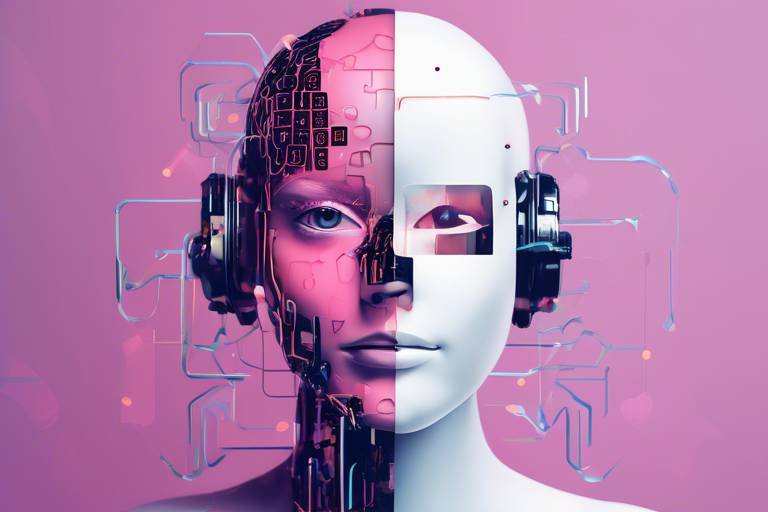AI and Big Data: A Paradigm Shift in Healthcare
In recent years, the healthcare industry has been undergoing a remarkable transformation, and at the heart of this revolution are artificial intelligence (AI) and big data. These two technological advancements are not just buzzwords; they represent a fundamental shift in how healthcare is delivered, managed, and experienced by patients and providers alike. Imagine walking into a hospital where doctors can predict your health issues before they even arise, or where treatments are tailored specifically to your genetic makeup. This is not science fiction; this is the power of AI and big data in action.
The integration of AI in healthcare is akin to having a highly skilled assistant who never tires and learns from every interaction. From enhancing diagnostic accuracy to personalizing treatment plans, AI technologies are proving to be invaluable. For instance, AI algorithms can analyze medical images with astonishing precision, often detecting conditions that may be overlooked by the human eye. This not only leads to quicker diagnoses but also improves overall patient outcomes.
On the other hand, big data acts as the backbone of this revolutionary change. The healthcare sector generates an enormous amount of data daily, from patient records to clinical trials. By harnessing this data, healthcare providers can uncover patterns and insights that were previously hidden. For example, big data analytics can identify trends in patient populations, allowing for proactive measures in public health. When combined with AI, the potential for improved patient care becomes limitless.
However, it’s essential to recognize that this transformation is not without its challenges. As we embrace the benefits of AI and big data, we must also navigate the complexities of data privacy and ethical considerations. Ensuring the protection of sensitive patient information is crucial, as is addressing the ethical implications of AI decision-making processes. As we move forward, establishing robust guidelines and regulations will be vital to safeguard patient trust and ensure equitable healthcare delivery.
In conclusion, the marriage of AI and big data is reshaping the healthcare landscape in ways that were once unimaginable. It is paving the way for innovative treatments, enhancing patient engagement, and ultimately leading to better health outcomes. As we stand on the brink of this new era, the possibilities seem endless, and the journey has only just begun.
- What are the main benefits of AI in healthcare?
AI improves diagnostic accuracy, personalizes treatment plans, and predicts patient outcomes, enhancing overall patient care. - How does big data contribute to healthcare?
Big data enables the analysis of vast amounts of patient data, facilitating informed decision-making and improving patient care. - What are the challenges of integrating AI and big data in healthcare?
Challenges include data privacy concerns, ethical considerations, and the need for robust infrastructure to support these technologies. - How can patient data privacy be ensured?
Implementing strict data protection regulations and best practices is essential to safeguard sensitive patient information. - What ethical concerns arise from AI in healthcare?
Key ethical issues include bias in AI algorithms, accountability for AI-driven decisions, and the need for transparency in AI processes.

Understanding AI in Healthcare
Artificial Intelligence (AI) is not just a buzzword; it’s a transformative force reshaping the landscape of healthcare as we know it. Imagine walking into a doctor's office where your medical history is instantly analyzed, potential diagnoses are suggested, and personalized treatment plans are crafted just for you—all before you even sit down. Sounds like something out of a sci-fi movie, right? But this is the reality that AI is bringing to the healthcare sector.
At its core, AI in healthcare refers to the use of algorithms and software to approximate human cognition in the analysis, interpretation, and comprehension of complex medical data. This technology is being harnessed to improve diagnostics, personalize treatment plans, and predict patient outcomes with an unprecedented level of accuracy. For instance, AI systems can analyze medical images, such as X-rays and MRIs, detecting anomalies that even the most experienced radiologists might miss. This not only boosts diagnostic accuracy but also speeds up the process, allowing for quicker interventions.
Moreover, AI is making waves in the realm of personalized medicine. Imagine a world where your treatment plan is uniquely tailored to your genetic makeup, lifestyle, and preferences. AI can sift through vast datasets to identify which treatments are most likely to work for you, taking into account factors that traditional methods might overlook. This is particularly crucial in oncology, where personalized treatment plans can significantly enhance patient outcomes.
But how does AI achieve all this? It employs various techniques, such as:
- Machine Learning: This subset of AI enables systems to learn from data patterns and improve over time without being explicitly programmed. In healthcare, machine learning can predict disease outbreaks or identify patients at risk for certain conditions.
- Natural Language Processing (NLP): NLP allows machines to understand and interpret human language. This is particularly useful for analyzing unstructured data, like clinical notes and patient feedback, providing insights that can enhance patient care.
- Robotic Process Automation (RPA): RPA automates routine tasks, freeing healthcare professionals to focus on more complex patient interactions.
As we delve deeper into this paradigm shift, it's essential to recognize that while AI offers incredible potential, it also comes with challenges. The integration of AI technologies into healthcare systems is not without its hurdles. Issues such as data privacy, ethical considerations, and the need for a robust infrastructure must be addressed to fully harness the benefits of AI.
In summary, the understanding of AI in healthcare is not just about technology; it’s about improving lives. By enhancing diagnostic processes, personalizing treatment, and predicting outcomes, AI is paving the way for a more efficient, effective, and patient-centered healthcare system. As we continue to explore these advancements, it’s crucial to remain vigilant about the ethical implications and ensure that patient safety and privacy are always prioritized.
Q1: How is AI used in diagnostics?
A1: AI algorithms analyze medical images and patient data to identify patterns and anomalies, assisting healthcare professionals in making accurate diagnoses.
Q2: Can AI personalize treatment plans?
A2: Yes, AI can analyze a patient's genetic information, lifestyle choices, and medical history to create tailored treatment plans that are more effective.
Q3: What are the ethical concerns surrounding AI in healthcare?
A3: Ethical concerns include data privacy, potential bias in AI algorithms, and the need for transparency and accountability in AI decision-making processes.

The Role of Big Data
Big data analytics is revolutionizing the healthcare industry by enabling the collection, storage, and analysis of vast amounts of patient information. This data-driven approach empowers healthcare providers to make informed decisions that lead to improved patient outcomes. Imagine having the ability to predict health trends, identify at-risk populations, and tailor treatments to individual needs—all thanks to the power of big data. It's like having a crystal ball that helps healthcare professionals see into the future of patient care.
One of the most significant benefits of big data in healthcare is its ability to enhance patient care. By analyzing large datasets, healthcare organizations can identify patterns that may not be apparent through traditional methods. For instance, big data can reveal correlations between lifestyle choices and health outcomes, allowing doctors to recommend personalized interventions. This is where the magic happens: data becomes a tool for preventive care, helping patients avoid serious health issues before they arise.
Moreover, big data analytics plays a critical role in operational efficiency. Hospitals and clinics can streamline their processes by examining data related to patient flow, resource allocation, and treatment effectiveness. For example, by analyzing patient admission rates, hospitals can optimize staffing levels, ensuring that they have the right number of healthcare professionals available at peak times. This not only improves patient satisfaction but also enhances the overall quality of care.
Additionally, big data is instrumental in research and development within the healthcare sector. Pharmaceutical companies and research institutions utilize large datasets to identify potential new drugs, analyze clinical trial results, and understand patient responses to various treatments. This data-driven approach accelerates the pace of innovation, leading to the development of new therapies and solutions that can save lives.
To illustrate the impact of big data in healthcare, consider the following table that highlights key areas where big data is making a difference:
| Area | Impact of Big Data |
|---|---|
| Patient Care | Personalized treatment plans based on data analysis |
| Operational Efficiency | Optimized resource allocation and staffing |
| Research and Development | Accelerated drug discovery and clinical trials |
| Predictive Analytics | Identification of at-risk patients for preventive measures |
In conclusion, the role of big data in healthcare cannot be overstated. It is reshaping how we approach patient care, operational efficiency, and medical research. As we continue to harness the power of data, the healthcare landscape will evolve, leading to better outcomes for patients and more effective healthcare systems.
- What is big data in healthcare? Big data in healthcare refers to the extensive volume of health-related data collected from various sources, which can be analyzed to improve patient outcomes and healthcare efficiency.
- How does big data improve patient care? By analyzing large datasets, healthcare providers can identify trends and patterns that inform personalized treatment plans, preventive care, and better resource management.
- What are some challenges associated with big data in healthcare? Challenges include data privacy concerns, the need for robust infrastructure, and ensuring data accuracy and quality.

Data Collection Methods
In the rapidly evolving landscape of healthcare, the methods used to collect data have become increasingly diverse and sophisticated. The integration of technology into healthcare practices has opened up a world of possibilities for gathering patient information, which is crucial for enhancing care quality and improving outcomes. One of the most significant advances in data collection comes from Electronic Health Records (EHRs), which serve as a digital version of a patient's paper chart. EHRs allow for real-time access to patient data, ensuring that healthcare providers have the most up-to-date information available at their fingertips. This not only streamlines the process of patient care but also facilitates better communication among healthcare teams.
Moreover, the advent of wearable technology has revolutionized how we monitor health. Devices such as fitness trackers and smartwatches can collect a wealth of data on a patient's vital signs, activity levels, and even sleep patterns. This real-time data collection enables patients to take a more active role in their health management, fostering a sense of empowerment and encouraging healthier lifestyle choices. For instance, a patient with diabetes can monitor their blood glucose levels continuously, allowing for immediate adjustments to their treatment plan based on real-time feedback.
Additionally, patient surveys play a vital role in data collection. These surveys can gather subjective data about a patient's experience, symptoms, and overall satisfaction with their care. The insights gained from patient feedback are invaluable, as they can highlight areas for improvement and help healthcare providers tailor their services to better meet the needs of their patients. The combination of quantitative data from EHRs and wearables, along with qualitative data from surveys, creates a comprehensive picture of patient health.
To illustrate the various methods of data collection, let's take a look at the following table:
| Data Collection Method | Description | Impact on Patient Care |
|---|---|---|
| Electronic Health Records (EHRs) | Digital records of patient health information | Improves care coordination and accessibility of patient data |
| Wearable Technology | Devices that monitor health metrics in real-time | Enhances patient engagement and self-management |
| Patient Surveys | Feedback tools to gather patient experiences and satisfaction | Identifies areas for improvement in healthcare delivery |
In conclusion, the methods of data collection in healthcare are not just about gathering numbers; they are about creating a holistic view of patient health that informs treatment decisions and enhances the overall quality of care. As technology continues to advance, we can expect these methods to evolve further, paving the way for even more innovative approaches to patient care.
- What are Electronic Health Records (EHRs)? EHRs are digital versions of patients' paper charts, providing real-time access to patient data for healthcare providers.
- How do wearable devices improve health monitoring? Wearable devices collect real-time data on health metrics, allowing patients and healthcare providers to make informed decisions about treatment and lifestyle changes.
- Why are patient surveys important? Patient surveys gather feedback on experiences and satisfaction, helping healthcare providers identify areas for improvement in their services.

Wearable Technology
Wearable technology is not just a trend; it's a game changer in the healthcare landscape. Imagine having a mini health monitor strapped to your wrist, constantly tracking your heart rate, activity levels, and even your sleep patterns. This is the reality that wearables bring to the table. These devices, ranging from smartwatches to fitness trackers, are revolutionizing how we manage our health and wellness. They provide real-time data that can empower patients to take control of their health, leading to better outcomes and improved quality of life.
One of the most significant advantages of wearable technology is its ability to promote patient engagement. By giving individuals direct access to their health metrics, wearables encourage them to be proactive about their health. For instance, if a user notices their heart rate spikes during exercise, they might adjust their routine or consult a healthcare provider. This kind of immediate feedback loop fosters a deeper understanding of personal health and can motivate lifestyle changes that lead to long-term benefits.
Moreover, wearable devices are becoming increasingly sophisticated, integrating advanced sensors and AI algorithms that not only track health metrics but also analyze trends over time. For example, a recent study showed that wearables can help detect early signs of conditions like atrial fibrillation, potentially preventing serious health issues before they escalate. This predictive capability is a prime example of how technology is enhancing preventive care, allowing healthcare providers to intervene earlier and tailor treatments to individual needs.
However, it's essential to recognize that the effectiveness of wearable technology hinges on the quality of the data collected. As more people adopt these devices, the volume of health data generated is staggering. According to a report by Statista, the global wearable technology market is projected to reach over $60 billion by 2023. This influx of data presents both opportunities and challenges in terms of data management and analysis. Healthcare providers must ensure that they have the infrastructure in place to process this information efficiently and securely.
In conclusion, wearable technology is paving the way for a more connected and informed approach to healthcare. As these devices continue to evolve, they will play an even more significant role in empowering patients, enhancing data collection, and ultimately improving health outcomes. The future of healthcare is indeed wearable, and it's exciting to think about the possibilities that lie ahead.
- What types of wearable technology are available? Wearable technology includes smartwatches, fitness trackers, smart clothing, and health monitoring devices.
- How do wearables improve patient health? They provide real-time health data, promote engagement, and help detect health issues early.
- Are there privacy concerns with wearable technology? Yes, data privacy is a significant concern, and users should ensure their devices comply with regulations and best practices.

Electronic Health Records
Electronic Health Records (EHRs) have become a cornerstone of modern healthcare, revolutionizing the way patient information is stored, accessed, and shared. Imagine walking into a doctor's office and having your entire medical history, allergies, medications, and test results available at the click of a button! This seamless access not only enhances the efficiency of healthcare providers but also significantly improves patient safety. With EHRs, clinicians can easily review a patient's history, ensuring that they make informed decisions based on comprehensive data.
One of the most compelling benefits of EHRs is their ability to facilitate care coordination among multiple healthcare providers. When a patient sees several specialists, EHRs ensure that all parties involved have access to the same, up-to-date information. This interconnectedness minimizes the risk of duplicated tests and conflicting treatments, ultimately leading to better patient outcomes. In fact, studies have shown that healthcare systems utilizing EHRs report a reduction in medical errors and enhanced patient satisfaction.
However, the implementation of EHRs is not without its challenges. Transitioning from paper-based records to electronic systems requires significant investment in technology and training. Many healthcare facilities, especially smaller practices, may struggle with the costs associated with adopting EHR systems. Additionally, there is a learning curve for staff, and resistance to change can hinder the process. To address these challenges, many organizations are investing in training programs and support systems to help staff adapt to the new technology.
Despite these hurdles, the advantages of EHRs far outweigh the drawbacks. They not only improve the quality of care but also contribute to the overall efficiency of healthcare operations. For instance, EHRs enable healthcare providers to generate reports and analyze data trends, which can lead to enhanced public health initiatives and research opportunities. With the ability to track patient outcomes over time, EHRs serve as invaluable tools for identifying patterns and developing new treatment protocols.
In conclusion, Electronic Health Records are more than just digital files; they represent a paradigm shift in how healthcare is delivered. By streamlining information sharing and improving care coordination, EHRs empower healthcare providers to deliver safer, more effective care. As technology continues to evolve, the integration of EHRs into everyday practice will undoubtedly pave the way for even greater advancements in patient care.
- What is an Electronic Health Record (EHR)?
EHRs are digital versions of patients' paper charts, containing comprehensive medical history and treatment information. - How do EHRs improve patient care?
EHRs enhance patient care by providing healthcare providers with easy access to complete patient information, leading to better decision-making and reduced errors. - Are EHRs secure?
Yes, EHRs are designed with various security measures to protect patient data, including encryption and access controls. However, data privacy remains a significant concern. - What challenges do healthcare providers face when implementing EHRs?
Challenges include the cost of implementation, staff training, and resistance to change within the organization.

Data Analytics Techniques
In the ever-evolving world of healthcare, have emerged as powerful tools that not only enhance patient outcomes but also streamline healthcare operations. By employing various methodologies, healthcare providers can sift through mountains of data to uncover insights that were previously hidden. These techniques, such as predictive modeling and machine learning, allow for a more proactive approach to patient care, transforming the way medical professionals interact with data.
Predictive modeling, for instance, is akin to having a crystal ball that forecasts potential health issues before they arise. By analyzing historical data, healthcare providers can identify patterns that may predict future ailments. This not only allows for early interventions but also helps in allocating resources more effectively. For example, a hospital might use predictive analytics to determine which patients are at higher risk for readmission, enabling them to implement targeted follow-up care.
On the other hand, machine learning is like training a smart assistant that learns from experience. With each new piece of data, the algorithms improve, becoming more accurate in their predictions. This technique can analyze complex datasets far beyond human capability, identifying trends and anomalies that could indicate a patient’s changing health status. The beauty of machine learning lies in its adaptability; as more data becomes available, the system evolves, continuously improving its predictive capabilities.
To illustrate the impact of these techniques, consider the following
| Data Analytics Technique | Application in Healthcare | Benefits |
|---|---|---|
| Predictive Modeling | Forecasting patient readmissions | Early interventions, reduced costs |
| Machine Learning | Identifying disease outbreaks | Rapid response, improved public health |
| Natural Language Processing | Analyzing patient feedback | Enhanced patient satisfaction, actionable insights |
Moreover, the integration of natural language processing (NLP) into healthcare analytics is revolutionizing how patient feedback is interpreted. By analyzing unstructured data from sources like patient surveys and social media, NLP algorithms can extract sentiments and trends that inform care strategies. This holistic approach to data analytics not only enriches the understanding of patient experiences but also fosters a culture of continuous improvement in healthcare delivery.
In conclusion, the application of data analytics techniques in healthcare is not just a trend; it is a paradigm shift that is reshaping the industry. By harnessing the power of predictive modeling, machine learning, and natural language processing, healthcare providers can make more informed decisions, ultimately leading to better patient care and optimized operational efficiency. As we delve deeper into the world of AI and big data, the potential for innovation in healthcare continues to expand, promising a future where data-driven insights play a central role in patient outcomes.
- What is predictive modeling in healthcare?
Predictive modeling uses historical data to forecast future health outcomes, allowing for early interventions and better resource allocation. - How does machine learning benefit healthcare?
Machine learning analyzes large datasets to identify trends and anomalies, improving the accuracy of predictions and patient care. - What role does natural language processing play in healthcare?
NLP helps analyze unstructured data, such as patient feedback, to extract valuable insights that enhance patient satisfaction and care strategies.

Challenges of AI and Big Data
The integration of artificial intelligence (AI) and big data into the healthcare landscape is not without its challenges. While these technologies promise to revolutionize patient care and operational efficiency, they also bring forth a myriad of obstacles that must be addressed. One of the most pressing issues is data privacy. In an era where patient information is increasingly digitized and shared, ensuring the confidentiality and security of sensitive data is paramount. Healthcare organizations must navigate a complex web of regulations, such as the Health Insurance Portability and Accountability Act (HIPAA) in the United States, to protect patient information from breaches and misuse.
Moreover, the ethical considerations surrounding AI deployment in healthcare cannot be overlooked. The algorithms that power AI systems can inadvertently introduce bias, leading to disparities in care delivery. For example, if an AI model is trained on data that is not representative of the entire patient population, it may produce skewed results, ultimately affecting diagnosis and treatment options. This raises questions about accountability—who is responsible when an AI system makes an erroneous recommendation? The need for transparency in AI decision-making processes is critical to build trust among healthcare providers and patients alike.
Another significant challenge is the infrastructure required to support AI and big data initiatives. Many healthcare facilities, especially smaller practices, may lack the necessary technological resources to implement these advanced systems. This can create a divide between larger institutions that can afford cutting-edge technology and smaller providers who may struggle to keep up. To bridge this gap, investments in healthcare IT infrastructure and training for healthcare professionals are essential.
To summarize, the challenges of integrating AI and big data in healthcare can be categorized into three main areas:
- Data Privacy Issues: Protecting sensitive patient information from breaches and ensuring compliance with regulations.
- Ethical Considerations: Addressing bias in AI algorithms and establishing accountability in decision-making.
- Infrastructure Needs: Ensuring that healthcare facilities have the necessary resources and training to implement AI and big data solutions.
Addressing these challenges requires a collaborative effort from stakeholders across the healthcare spectrum, including policymakers, technology developers, and healthcare providers. By fostering an environment of innovation while prioritizing ethical standards and patient privacy, we can harness the full potential of AI and big data to improve healthcare outcomes.
- What are the main challenges of AI in healthcare? The primary challenges include data privacy, ethical considerations, and the need for robust infrastructure.
- How can data privacy be ensured in healthcare AI applications? By adhering to regulations such as HIPAA and implementing best practices for data security.
- What ethical concerns are associated with AI in healthcare? Issues include algorithmic bias, accountability, and the need for transparency in AI decision-making.

Data Privacy Issues
In today's digital age, where data is often referred to as the new oil, data privacy has become a hot topic, especially in the realm of healthcare. With the rise of big data and artificial intelligence, healthcare providers are collecting and analyzing vast amounts of patient information, which raises significant concerns about how this sensitive data is handled. Imagine sharing your deepest health secrets with your doctor only to find out that this information is not as secure as you thought. This is the reality many patients face today.
One of the primary concerns surrounding data privacy in healthcare is the potential for data breaches. Cyberattacks on healthcare systems have been on the rise, with hackers targeting electronic health records (EHRs) to steal personal information. In fact, according to recent statistics, over 50% of healthcare organizations have experienced a data breach in the past few years. This alarming trend highlights the need for robust security measures to protect patient data.
To mitigate these risks, healthcare organizations must prioritize compliance with data protection regulations such as the Health Insurance Portability and Accountability Act (HIPAA) in the United States. HIPAA sets strict guidelines on how healthcare providers should handle patient information, ensuring that data is stored securely and accessed only by authorized personnel. Failure to comply with these regulations can result in hefty fines and damage to a provider's reputation.
Moreover, it’s crucial for healthcare providers to adopt best practices for safeguarding sensitive patient information. This includes:
- Implementing strong encryption methods for data storage and transmission.
- Regularly updating software and systems to protect against vulnerabilities.
- Conducting training sessions for staff on data privacy and security protocols.
- Establishing clear policies for data access and sharing.
Another significant aspect of data privacy is the ethical use of patient data. With the advent of AI technologies, there is a risk that algorithms may inadvertently introduce bias or misuse data. For example, if an AI system is trained on data that is not representative of the entire population, it may lead to skewed results that could adversely affect certain groups of patients. This raises questions about the accountability of healthcare providers and AI developers in ensuring equitable treatment for all patients.
In conclusion, while AI and big data hold immense potential to revolutionize healthcare, it is imperative to address the that accompany these advancements. By implementing stringent security measures, adhering to regulations, and fostering an ethical approach to data use, healthcare organizations can build trust with patients and ensure that their sensitive information is protected.
Q: What are the main data privacy concerns in healthcare?
A: The main concerns include data breaches, unauthorized access to patient information, and the ethical use of data in AI applications.
Q: How can healthcare providers protect patient data?
A: They can implement strong encryption, comply with regulations like HIPAA, conduct staff training, and establish clear data access policies.
Q: What role do regulations like HIPAA play in data privacy?
A: Regulations like HIPAA set guidelines for how healthcare providers should handle patient information, ensuring it is stored securely and accessed only by authorized individuals.

Ethical Considerations
The integration of artificial intelligence (AI) in healthcare brings forth a myriad of ethical considerations that cannot be overlooked. These concerns are essential in ensuring that the technology not only enhances patient care but also adheres to moral and ethical standards. One of the most pressing issues is bias. AI systems are trained on data, and if that data reflects existing biases—whether racial, gender-based, or socio-economic—those biases can be perpetuated in the AI's decision-making processes. Imagine a scenario where an AI system is used to diagnose diseases but is less accurate for certain demographic groups due to biased training data. This can lead to unequal treatment and outcomes, exacerbating healthcare disparities.
Another critical aspect is accountability. When AI systems make decisions, it can be challenging to determine who is responsible for those decisions. Is it the developers of the AI, the healthcare providers using it, or the institutions that implement it? This ambiguity raises questions about liability, especially when an AI's recommendation leads to adverse patient outcomes. For instance, if a patient is misdiagnosed due to an AI's error, who is to blame? This lack of clarity can hinder the trust that patients place in healthcare providers and technologies.
Transparency is another ethical concern that deserves attention. Patients and healthcare professionals alike must understand how AI systems arrive at their conclusions. The "black box" nature of many AI algorithms can make it difficult to interpret their recommendations. This lack of transparency can lead to skepticism and resistance among healthcare professionals and patients, who may feel uncomfortable relying on a system they do not fully understand. To mitigate this, developers must strive to create AI systems that offer explainable results, allowing users to grasp the rationale behind recommendations.
Furthermore, data privacy is paramount in the age of big data. With AI systems requiring vast amounts of patient data to function effectively, safeguarding this sensitive information is crucial. Patients must feel confident that their personal health information is secure and will not be misused. This necessitates robust data protection regulations and best practices to ensure that patient data is handled with the utmost care and respect.
In light of these ethical considerations, it is imperative to establish comprehensive guidelines that govern the development and deployment of AI in healthcare. These guidelines should encompass the following:
- Ensuring diverse and representative training data to minimize bias.
- Establishing clear accountability frameworks for AI decision-making.
- Promoting transparency in AI algorithms and their decision processes.
- Implementing stringent data privacy measures to protect patient information.
By addressing these ethical challenges head-on, the healthcare industry can harness the full potential of AI while ensuring that patient welfare remains at the forefront. The goal is not just to innovate but to do so responsibly, creating an environment where technology complements the human touch in healthcare.
Q1: What are the main ethical concerns regarding AI in healthcare?
A1: The primary ethical concerns include bias in AI algorithms, accountability for AI-driven decisions, transparency in how AI systems operate, and the protection of patient data privacy.
Q2: How can bias in AI be minimized?
A2: Bias can be minimized by using diverse and representative datasets for training AI systems, regularly auditing algorithms for biased outcomes, and involving diverse teams in the development process.
Q3: Why is transparency important in AI healthcare applications?
A3: Transparency is crucial because it builds trust among healthcare professionals and patients, allowing them to understand and feel confident in the AI's recommendations and decisions.
Q4: What measures can be taken to protect patient data privacy?
A4: Measures include implementing strong data encryption, adhering to strict data protection regulations, and ensuring that patient data is anonymized when used for AI training.
Frequently Asked Questions
- What is the impact of AI on healthcare?
AI is revolutionizing healthcare by improving diagnostics, personalizing treatment plans, and predicting patient outcomes. It helps healthcare professionals make more informed decisions, ultimately enhancing patient care and operational efficiency.
- How does big data contribute to healthcare?
Big data analytics allows for the collection and analysis of vast amounts of patient data, enabling healthcare providers to make data-driven decisions. This leads to improved patient care, better resource management, and innovative treatment solutions.
- What are some common methods of data collection in healthcare?
Common methods include electronic health records (EHRs), wearable devices, and patient surveys. These techniques help in gathering comprehensive data, which is crucial for effective analysis and patient management.
- How do wearable technologies enhance patient care?
Wearable devices monitor patient health in real-time, providing valuable data that can lead to proactive care. They engage patients in their health management, making it easier for them to track their progress and stay connected with healthcare providers.
- What challenges does the integration of AI and big data face?
Challenges include data privacy concerns, ethical issues, and the need for robust infrastructure. Addressing these challenges is essential to ensure that AI and big data can be effectively and safely utilized in healthcare.
- How is patient data privacy protected?
Patient data privacy is protected through strict regulations and best practices, such as encryption and access controls. Healthcare organizations must comply with laws like HIPAA to safeguard sensitive information.
- What ethical considerations are there in using AI in healthcare?
Ethical considerations include issues of bias, accountability, and transparency. It is crucial to develop ethical guidelines to ensure that AI technologies are used responsibly and equitably in healthcare settings.



















